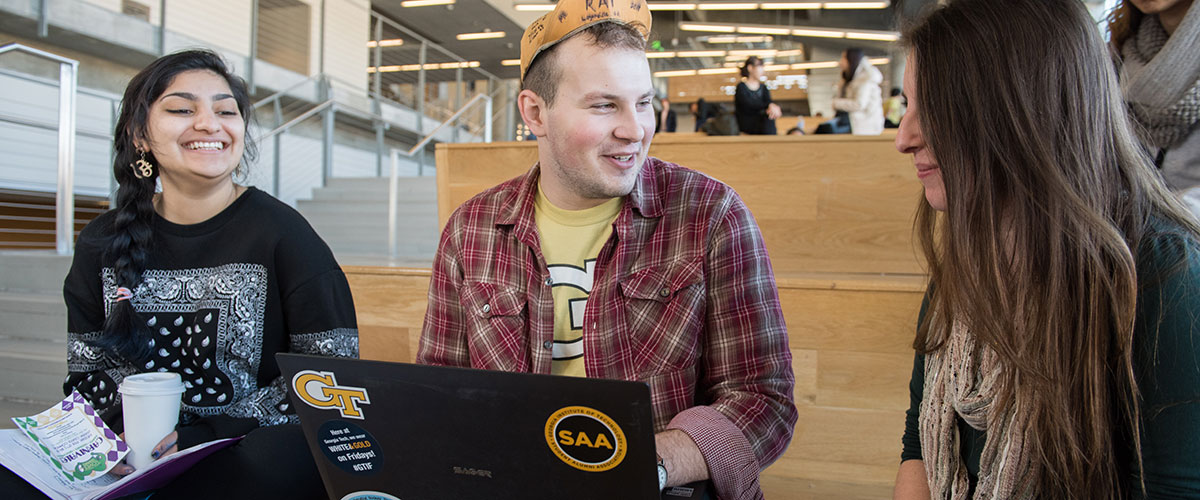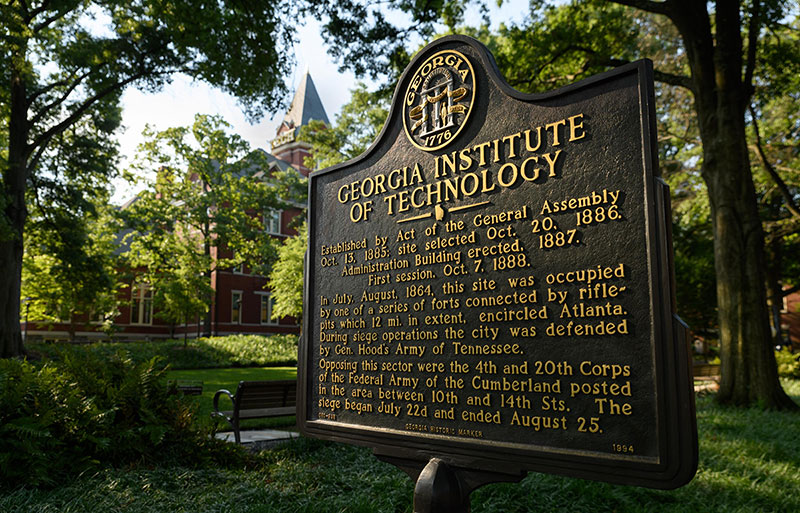Georgia Tech, home to some of the world’s best and brightest students, is committed to creating an inclusive and vibrant academic environment, and to being a champion of lifelong learning.
From our traditional residential students completing their undergraduate or graduate studies, to our mid-career professionals enrolled in online degree and non-degree programs, to the many high school students in dual enrollment courses, Yellow Jackets hail from all backgrounds and join us from across the state of Georgia, the nation, and the world. They come to study at Georgia Tech under the expert instruction and guidance of our faculty scholars and innovators, supported by a dedicated and diverse staff. Here, they find fertile ground for their interests and ideas in and out of the classroom — sparking the beginnings of a phenomenal career to come.
Steven L. McLaughlin
Provost and Executive Vice President for Academic Affairs
Positive Note for New Fiscal Year
Despite the Covid-19 pandemic, Georgia Tech continued to amplify impact and expand access by enrolling record numbers of undergraduate students from around the state, nation, and world. In Spring, Summer, and Fall 2021, Tech welcomed 4,876 new students — including 100 more first-year students from Georgia than last year.
Students in the incoming class hail from 102 of Georgia’s 159 counties (12% from rural areas in the state), all 50 states, and 93 countries, with the racial/ethnic makeup of the class reflecting the following percentages (rounded): Black - 9%, Hispanic - 10%, multiracial - 4%, unreported - 1%, white - 38%, and Asian - 39%. The combined incoming class of first-year and transfer students also includes 14% coming from a household where neither parent graduated from college.
“This 80% increase in first-generation college students over the past five years is a testament to the Institute’s commitment to expanding access,” says Director of Undergraduate Admission Rick Clark. “Undergraduate Admission utilizes a variety of transfer pathway programs, including the First-Generation Transfer Pathway, Talent Initiative Transfer Pathway, Veterans Pathway, and the newly launched Atlanta Public Schools Transfer Pathway, to expand access to students from all across Georgia.”
Additionally, for this academic year, almost 700 students, representing Georgia high schools from Habersham to Glynn counties, registered for Tech’s dual enrollment programs.
Transfer Pathway Programs Expand Access to a Georgia Tech Degree
Georgia Tech continues to expand access for students in the Atlanta Public Schools (APS) system through a variety of outreach programs.
In March 2021, President Ángel Cabrera welcomed APS Superintendent Lisa Herring, along with leaders and alumni from Georgia Tech and APS, to Harrison Square to announce the APS Transfer Pathway Program, an initiative designed to help graduates from APS find themselves, their passions, and their futures at Georgia Tech.
Interest from APS students in a Georgia Tech education has risen dramatically over the past three years, with first-year applications from the system increasing by 68%. Beginning in Spring 2021, any qualified first-year applicant from APS not admitted to Tech will have a guaranteed transfer offer via the new pathway program.
The APS Pathway makes the eighth articulated transfer pathway offered to students who do not begin their studies at Tech. Other pathways center around first-generation students, Pell-eligible students, veterans, and students pursuing specific majors.
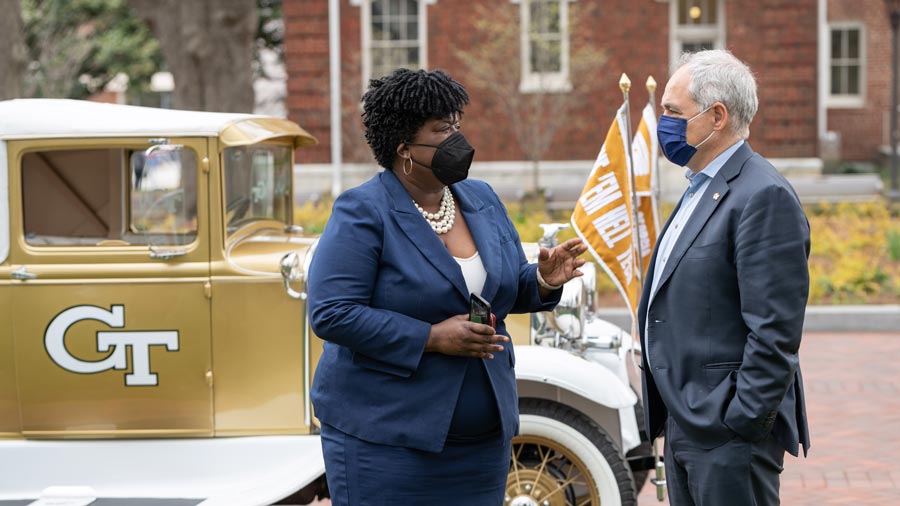
President Ángel Cabrera speaks with Atlanta Public Schools Superintendent Lisa Herring on campus.
NCAA Graduation Success Rate Matches All-Time High
Georgia Tech’s 89% GSR matches the school record set in 2018. Tech has achieved a GSR of 88% or higher for four consecutive years.
For the second-straight year, five of Georgia Tech’s 13 sports programs* own perfect 100% GSRs (women’s cross country/track, golf, softball, men’s tennis and volleyball). Head coach Bruce Heppler’s golf program has posted a 100% GSR all 16 years since the metric was introduced in 2005. Volleyball has recorded perfect GSRs for eight consecutive years.
Ten of Georgia Tech’s 13 sports have GSRs higher than or equal to the national average for their respective sports (men’s cross country/track, women’s cross country/track, football, golf, softball, men’s swimming and diving, women’s swimming and diving, men’s tennis, women’s tennis and volleyball), which is up from nine teams a year ago.
Golf exceeds the national average in its sport by 10 percentage points, while women’s cross country/track and field and football are nine points higher than the national averages for their sports. Softball and men’s tennis each exceeded their sport’s national average by eight points.
*Cross country, indoor track and field, and outdoor track and field are compiled as one sport for GSR reporting.

Blue HR Section Div
Evening MBA Program Enrolls Largest Ever Number of Women in an Academic Year

The Evening MBA program at Georgia Tech's Scheller College of Business enrolled the largest number of women ever in a single academic year for its Fall 2020 and Spring 2021 intakes. The Spring 2021 entering class enrolled the highest number of women for a spring cohort, nearly reaching gender parity at 49% women. Scheller’s Full-time MBA program continued to make strides as well: 39% of the program’s 2020 graduates were women. In Scheller's Executive MBA program, 38% of the December 2020 graduating class was made up of women.
Scheller’s MBA programs provide a variety of clubs and committees for women students and alumni, including Women in Business and Women of Influence. Women in Business provides a forum for MBA students to strengthen ties among themselves and the wider business community. Through workshops and thought-provoking speaker events, the organization aims to promote a culture of inclusion at Scheller and beyond, equipping MBA students with the skills they need to manage and retain diverse talent. Women of Influence aligns with the goals of Women in Business but targets Evening MBA students.

New School Builds on Georgia Tech's Commitment to Advancing Cybersecurity and Privacy Education
Georgia Tech, which has been named No. 2 in undergraduate cybersecurity education by U.S. News & World Report, has built upon its success by launching a new School of Cybersecurity and Privacy. The new School is the first of its kind among top research universities and will amplify the impact of Georgia Tech’s considerable investments in cybersecurity and privacy education research. Tech already has three cybersecurity degree programs, including the Online Master’s in Cybersecurity, which has expanded access to the field.
The School is well-placed to champion innovation, with more than 500 cybersecurity researchers in four Colleges and GTRI, and more than $180 million in cybersecurity research awards annually. Georgia Tech’s faculty are ranked No. 2 in the world in publications in top security conferences.
The new School of Cybersecurity and Privacy is a reflection of Georgia Tech’s strengths and commitment to serving the needs of our society and our state.
-Georgia Tech President Ángel Cabrera
The School of Cybersecurity and Privacy is led by Interim Chair Rich DeMillo, the Charlotte B. and Warren C. Chair of Computer Science and Professor of Management and a former dean of the College of Computing. A search for the first permanent chair is underway.
$3M Grant to Expand Biomedical Engineering’s Story-Driven Learning in College of Engineering
Helping students tell their stories has become an important part of the curriculum in the Wallace H. Coulter Department of Biomedical Engineering (BME) at Georgia Tech and Emory University. Now the idea is reaching other disciplines in the College of Engineering with the support of a $3.1 million grant from the Kern Family Foundation.
Under the new project — led by Coulter BME Professor Joe Le Doux — the Daniel Guggenheim School of Aerospace Engineering, the School of Civil and Environmental Engineering, and the College’s CREATE-X entrepreneurial program will infuse story-driven learning into their curricula to help students build “entrepreneurial mindsets.”
The idea is to help students see themselves as engineers ready and able to act, using all the skills they’re learning to solve problems and improve the human condition.
“We often don't give students a chance to sit back, reflect, and make connections about what they’re learning, who they are, where they're going,” said Le Doux, executive director of training and learning in the Coulter Department. “Some students do it on their own. But some don't. Those who do, really benefit from it.”
Le Doux said adopting entrepreneurial-minded learning as a key part of the curriculum throughout the College will be significant: Georgia Tech’s size and reputation mean the Institute has a major influence on engineering education around the nation.

GT-EQUAL Providing Bridge for Underrepresented Students to Pursue Graduate Studies
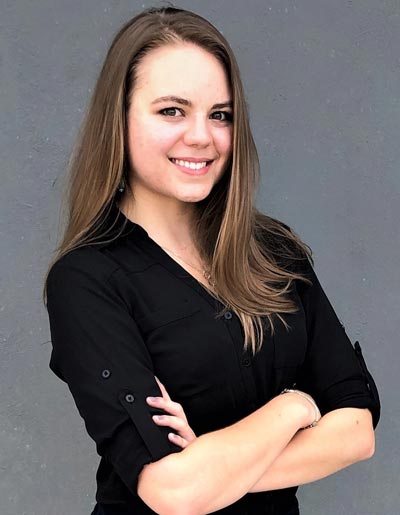
When Alexa Dobbs faced periodic challenges during her first year of graduate studies at Georgia Tech’s School of Chemical and Biomolecular Engineering (ChBE), she was grateful for plenty of support from faculty and fellow students through the GT-EQUAL (Graduate Training for Equality in Underrepresented Academic Leadership) Program.
“I’ve really appreciated the support system,” says Dobbs, a Native American who recently finished her master’s degree and is now pursuing a doctorate. She received tutoring when she needed it, as well as professional development support from professors, and the mentorship of another graduate student who was paired with her.
“They’ve been really helpful in navigating issues.”
The GT-EQUAL Program is one of two sites at Tech for the American Chemical Society’s Bridge Program, which aims to increase the number of Ph.D.s in the chemical sciences that are awarded to students from underrepresented groups.
GT-EQUAL is based in ChBE and is beginning its third year, while a second Bridge site in the School of Chemistry and Biochemistry was started in 2020. The Bridge sites enroll two Bridge fellows annually who will earn a thesis M.S. while receiving full funding, extensive support, mentoring, and training to prepare for success in a Ph.D. program.
Tech Adds U.S. Army Credentialing Assistance to Military Program Offerings
In October 2020, Georgia Tech expanded its selection of military programs by participating in the U.S. Army Credentialing Assistance (CA) Program.
Offered 100% online, the program focuses on military readiness and retention, offering soldiers professional opportunities that increase their employability and career progression, either in their current military occupational specialty or in an occupation they’d like to pursue upon transition from military service.
Under the program, Army active and reserve component soldiers can select and earn industry-recognized credentials like Project Management Professional and Lean Six Sigma Black Belt. These professional certifications are available with little-to-no-out-of-pocket costs, and annual funding from the CA covers course registrations, learning materials, exam fees, and more.
“Since 2013, more than 1,500 veterans have taken advantage of Georgia Tech’s sought-after resources for local servicemen and women,” said James Wilburn, military academic program director for Georgia Tech Professional Education. “As a CA provider, we are now able to support the educational journeys of even more military members — and their families — across the nation.”
Since 2013, more than 1,500 veterans have taken advantage of Georgia Tech’s sought-after resources for local servicemen and women . . . As a CA provider, we are now able to support the educational journeys of even more military members — and their families — across the nation.
-James Wilburn, Military Academic Program Director for Georgia Tech Professional Education


Online Master's Cybersecurity Program Celebrates 2 Years of Serving Lifetime Needs of Global Community
When Georgia Tech launched its Online Master of Science in Cybersecurity (OMS Cybersecurity) program in 2019, it had one common goal: Increase the number of trained and educated cybersecurity professionals in the workforce to meet growing industry demand.
In January 2021, the program entered its third year, with enrollments growing by 285%, largely surpassing the residential program that has existed on campus since 2002. Students in the program have a global and diverse vantage point, representing more than 630 companies, 45 U.S. states and territories, and 59 countries.
Even more, its flexible design has shattered barriers to entry, such as cost and time, giving significant access to individuals largely unable to access or afford such education.
“As part of Georgia Tech’s groundbreaking trio of Online Master of Science degrees, OMS Cybersecurity is the future of higher education,” said Nelson Baker, dean of Georgia Tech Professional Education. “Its industry-driven, multifaceted nature reflects the modern workforce, providing a pathway to address workforce shortages, and leading the way for industry and the Institute.”
Tower Awards Celebrate 27th Year
The Tower Awards were hosted by OMED: Educational Services (OMED) on April 8 and 9, 2021, across three ceremonies at the Georgia Tech Hotel. This year marked the 27th consecutive year the awards have celebrated the academic achievements of traditionally underrepresented students at Georgia Tech. Undergraduate and graduating graduate students were honored.
More than 1,700 students were eligible for a Tower Award this year, an increase from 2020 and 2019.
Award categories included: Ph.D. Awards; Master’s Awards (graduating GPA of 3.5 or higher); Graduating Senior Awards (cumulative GPA of 3.15 or higher); Sustained Awards (cumulative GPA of 3.15 or higher); Yearly Awards (GPA of 3.15 or higher over the past three semesters); Transfer/Dual-Degree Awards (cumulative GPA of 3.15 or higher); and First-Year Awards (cumulative GPA of 3.15 or higher).
Within each award category, except Ph.D. and Master’s Awards, subcategories included Bronze (GPA of 3.15-3.49); Silver (GPA of 3.50-3.94); and Gold (GPA of 3.95 or higher). Special awards, such as Student Leader Impact, were also presented. OMED, part of Institute Diversity, Equity, and Inclusion’s Center for Student Diversity and Inclusion, was supported by more than two dozen corporate partners and sponsors who provided honorees with messages of support and raffle giveaways at the ceremonies.
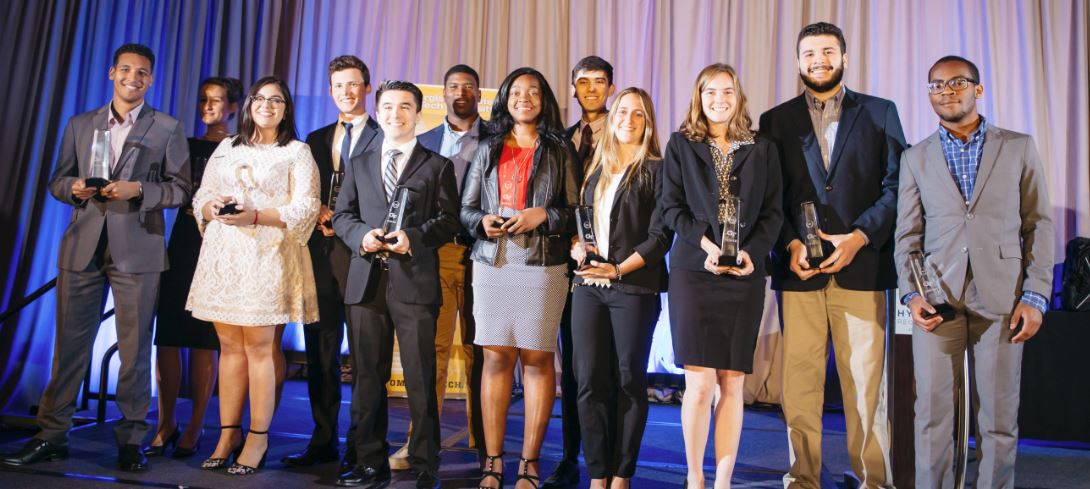
Andrés García Receives Distinguished Professor Award
Andrés García describes the Parker H. Petit Institute for Bioengineering and Bioscience (IBB) as “a fantastic community of faculty, trainees, and staff who come together in making discoveries and developing the technologies in bioengineering and bioscience that will change the world.”
García is the executive director of IBB and a Regents Professor in the Woodruff School of Mechanical Engineering. He is a champion of innovation, known as a global pioneer in developing biomaterials systems for translational applications in regenerative medicine. In recognition of his work, he received the 2021 Class of 1934 Distinguished Professor Award — the highest honor given to a Georgia Tech professor.
The award is presented to a professor who has made significant, long-term contributions to teaching, research, and public service.
Garcia’s research focuses on creating an engineered class of materials that can be used for applications to transplant a graft without immune-suppressive drugs. Researchers in his lab are developing new ways to treat Type 1 diabetes, eventually working with adult stem cells to reprogram them into insulin-producing cells. Future applications include addressing kidney failure and other diseases.
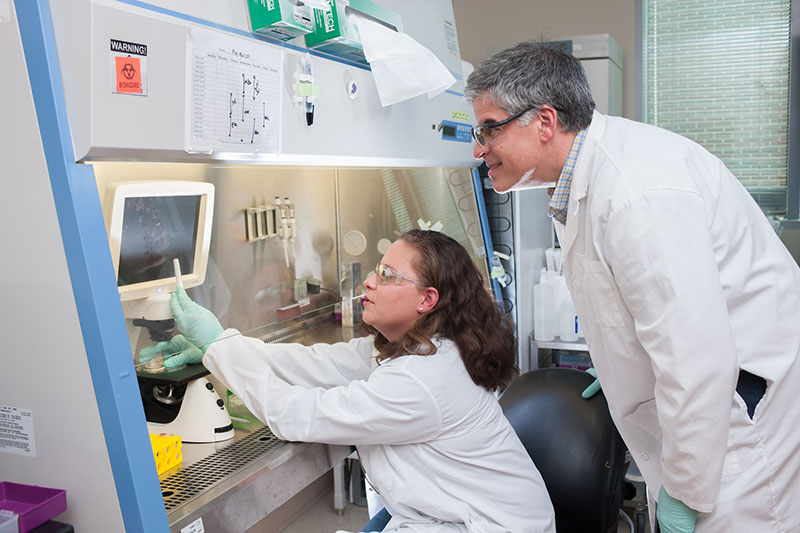
New 'Flourishing: Strategies for Well-Being and Resilience' Course Opens
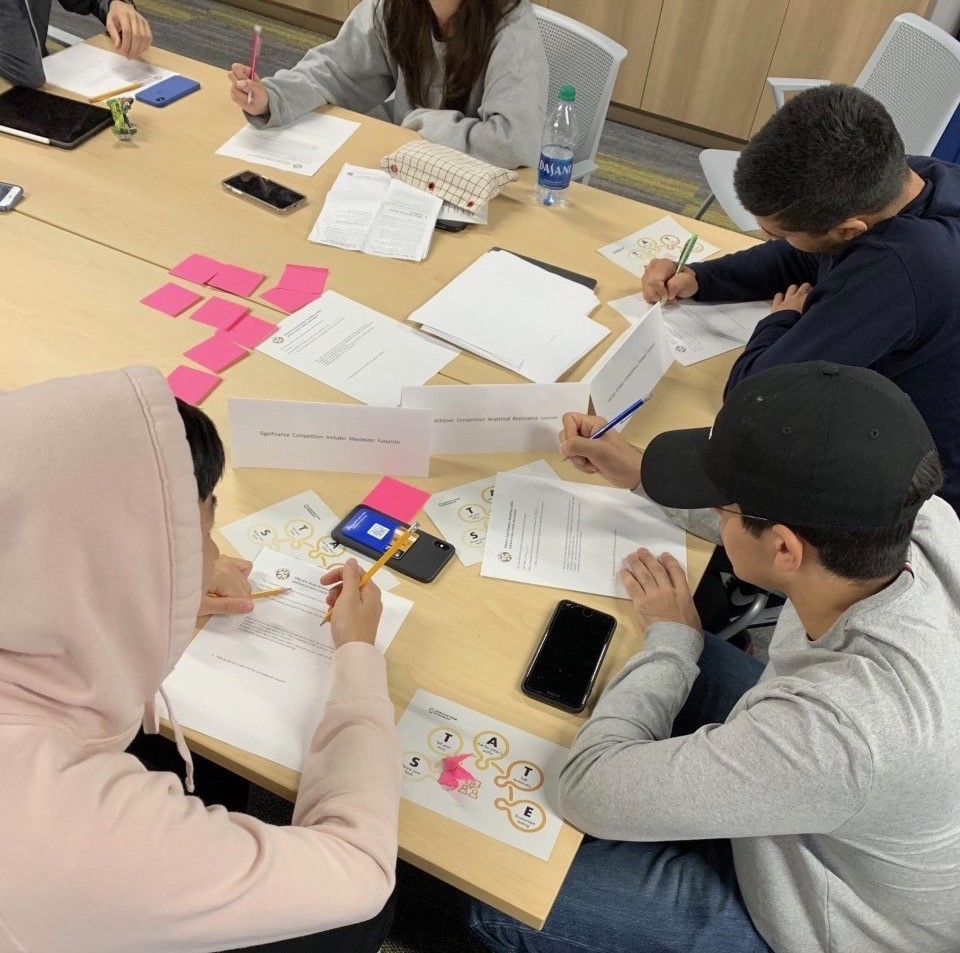
“Flourishing: Strategies for Well-being and Resilience” began as a pilot course in Fall 2019 led by School of Biological Sciences Lecturer Lesley Baradel and Academic Professional Christie Stewart. Now, the class is available to all undergraduate students at Georgia Tech — fulfilling the wellness requirement and offering a new toolkit for stress management, positive coping strategies, and resilience.
The class puts the concept of positive mental health at its forefront.
We started this course based on Georgia Tech data, along with national higher education trends, which demonstrated the need for courses that focused on strategies for managing stress, positive coping, and resilience.
-Christie Stewart, Academic Professional
While learning about conceptual pillars like optimism, gratitude, mindfulness, and emotional intelligence, students are also challenged to evaluate their current overall health and well-being status, and identify strategies for improvement in personal and professional growth to achieve a positive, meaningful, and fulfilling life.
Devesh Ranjan Selected as 2021 Governor’s Teaching Fellow
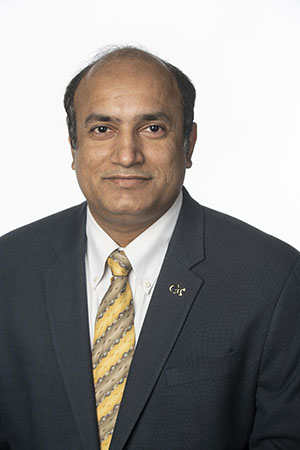
When he was named a 2021 Governor’s Teaching Fellow for the summer symposium program, Devesh Ranjan saw it as an opportunity to inform the delivery of instruction as it concerns the well-being of students, which he describes as a crisis — one that has been exacerbated by the pandemic.
“I strongly believe that the 21st-century challenge in higher education is to meet our students where they are,” says Ranjan.
Associate chair for Research, Ring Family Chair, and professor in the George W. Woodruff School of Mechanical Engineering, Ranjan’s participation in the program aligns well with Georgia Tech’s strategic focus on strengthening the Institute’s culture of well-being and creating an environment of holistic learning where all members of the campus community can grow and learn to lead healthy, purposeful lives.
His research disciplines include propulsion and combustion as well as aerodynamics and fluid mechanics. He is the fifth faculty member from Georgia Tech to be named a Governor’s Teaching Fellow.
Established by former Gov. Zell Miller in 1995, the program is offered through the Institute of Higher Education at the University of Georgia to provide opportunities, skills, and networking, with the goal of improving the quality of instruction in higher education.

Three New Female Chairs Take Design Helm
In Summer 2021, three outstanding women joined Georgia Tech as school chairs in the College of Design.
A thought leader in urban transportation planning, Gulsah Akar became chair of the School of City and Regional Planning July 1. She sees the School as a pioneer in interdisciplinary research and education, with the research being done at Georgia Tech setting national priorities. Also in July, Ece Erdogmus assumed her role as chair of the School of Building Construction. A highly respected architectural engineering scholar, Erdogmus is a leading researcher on structural analysis of masonry construction and in applying nondestructive testing techniques to ancient structures. Then on Aug. 1, EunSook Kwon became chair of the School of Industrial Design. She is an international authority on design thinking and the application of the creative process to product design.
Under their esteemed leadership, the College of Design will continue to amplify national and international impact in these fields. They are among seven new female faculty members in the College of Design this year.
Bernard Kippelen Named Vice Provost for International Initiatives

Throughout his 18 years at the Institute, Bernard Kippelen has helped ensure that Georgia Tech connects globally. Now, as the new vice provost for International Initiatives, he is leading the way in convening worldwide collaboration and building a global learning network to expand Georgia Tech’s reach and impact.
Until Aug. 1, 2021, he served as Joseph M. Pettit Professor in Georgia Tech’s School of Electrical and Computer Engineering and co-president of the Lafayette Institute in Metz, France. At the Lafayette Institute, Kippelen oversaw a collaborative innovation platform and commercialization initiative for optoelectronics and advanced materials research based at Georgia Tech-Lorraine.
He joined the faculty at the Georgia Tech School of Electrical and Computer Engineering in 2003 and served as director of Georgia Tech’s Center for Organic Photonics and Electronics from 2011 to 2019.
Kippelen replaces Yves Berthelot, who retired after 36 years of service to Georgia Tech. In assuming his new role, Kippelen said, “Working together across geopolitical, cultural, and linguistic boundaries gives us the ability to solve complex research challenges and prepare our students to become globally minded, cross-culturally competent leaders.”
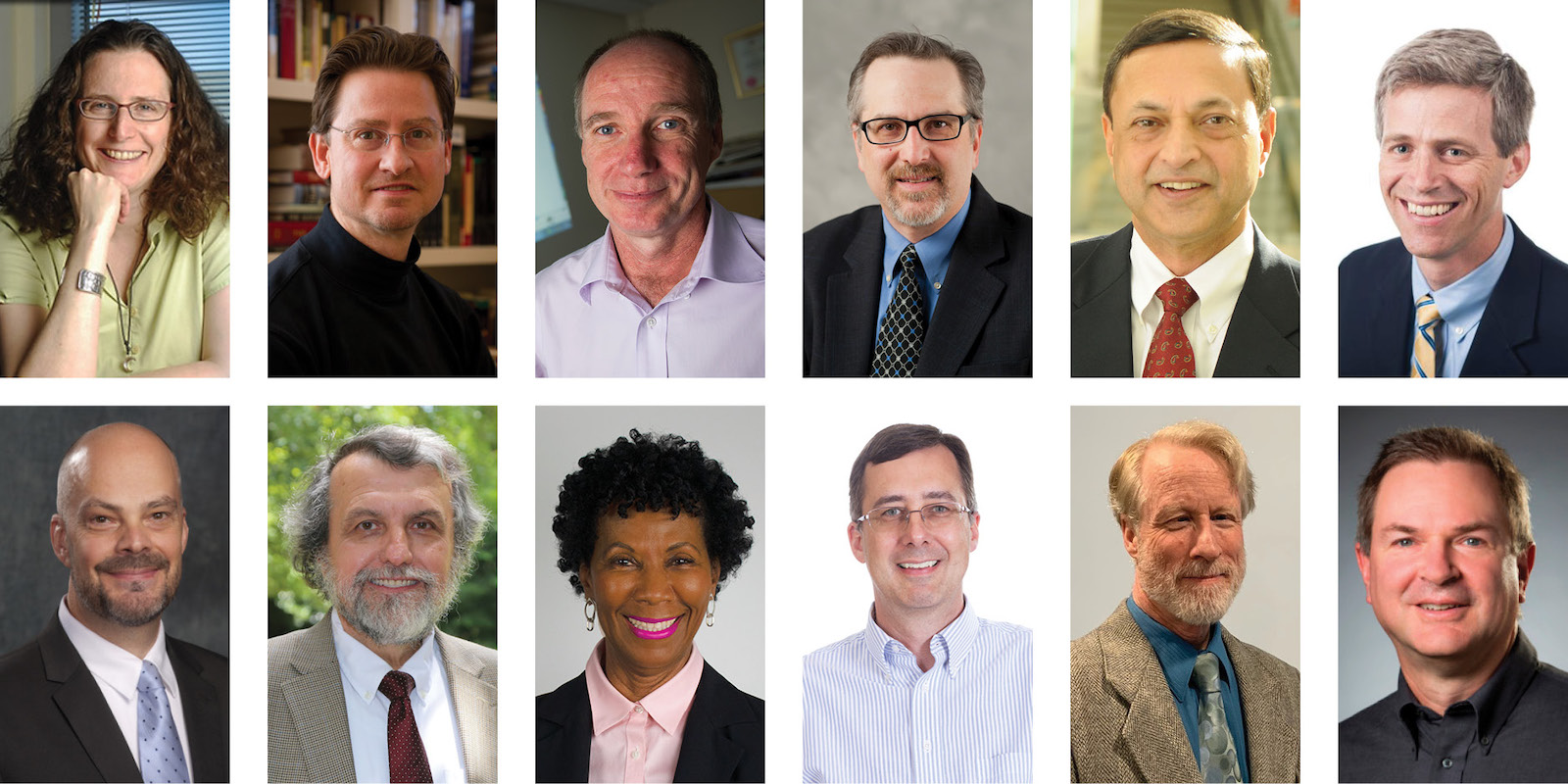
12 Georgia Tech Faculty Members Receive Regents Recognition
Several Georgia Tech faculty members have again received the highest academic recognition from the University System of Georgia (USG) Board of Regents.
Each year, College deans have the opportunity to nominate two academic faculty members for the Regents Professor title and one research faculty member for the Regents Researcher title. The Georgia Tech Research Institute can nominate two research faculty members for Regents Researcher.
The titles are awarded upon approval from the USG chancellor and its Committee on Academic Affairs — only with unanimous recommendation from the Institute Regents Professor and Researcher Selection Committee, the Institute’s president, the executive vice president for Research, and the provost and executive vice president for Academic Affairs.
The Board of Regents approved the nominations on Aug. 10, 2021.

